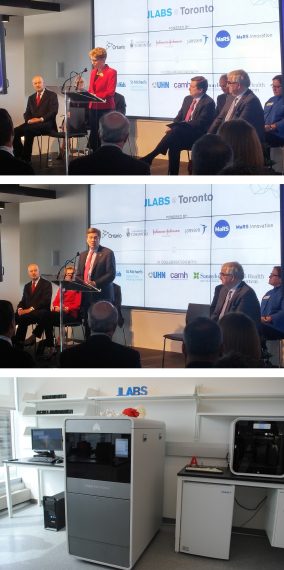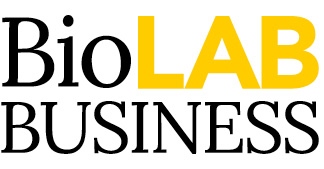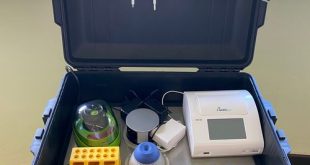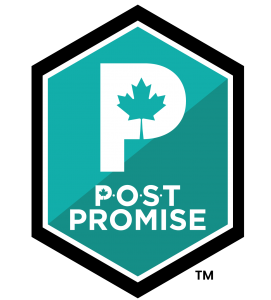Johnson & Johnson gives Toronto Life Science Startups a Leg Up
By Hermione Wilson
The event space and lounge at JLABS @Toronto resembles an ultra modern living room, stylishly decorated in purple and orange. Not exactly what you’d expect to see in a 40,000-sq. ft. life sciences incubator, but the lounge is just the beginning. The rest of the facility is made up of shared office and laboratory space that includes a chemical lab, biology labs, tissue culture and private cell culture facilities, a device and digital prototype lab, and a concept lab.
JLABS @ Toronto is the brainchild of Johnson & Johnson Innovation and the sixth of its kind. The other five JLABS locations are scattered throughout the U.S., in San Diego, San Francisco (two), Boston and Houston. Altogether, the JLABS facilities can house a total of 225 resident companies. The Toronto location, in its facility on the 13th floor of the west tower at the MaRS Discovery District building, has the capacity to house up to 50 startups. JLABS @Toronto officially opened on May 11 with 22 companies. That’s the most companies JLABS has had at an opening, says Melinda Richter, Head of Johnson & Johnson Innovation JLABS, and there is space for about 28 more.
“These 22 companies went through a whole variety of experts across Johnson & Johnson to get selected to be here,” Richter says. “Our experts had to be excited about the potential of these companies before they could get accepted.”
Of that first cohort of 22 startups, seven are winners of the JLABS @ Toronto Quick Fire Challenge. The award recognized promising early-stage innovation companies. AVROBIO is one of the seven, a company that blossomed at the University Health Network in Toronto in 2015, fertilized by new ex vivo gene therapy research.
An increasing body of evidence shows that ex vivo gene therapy provides long-term results, says President and CEO Geoff Mackay. “AVROBIO was a company that formed to pull in a lot of the management, clinical science, manufacturing experts in the field.”
The company will soon begin recruiting acute myeloid leukemia patients for clinical trials it is conducting at Princess Margaret Hospital. The patients, who are in remission due to chemotherapy treatment and are not eligible for a bone marrow transplant, will be recipients of AVROBIO’s unique ex vivo gene therapy approach.
“We transduce the cancer cells with a lentiviral vector to express a cytocline called IL12, a potent anti-cancer cytocline,” Mackay says. “Once we transfect these cells with IL12, we infuse them back [into the patient].” The idea, he says, is to flag cancer cells so that the patient’s own immune system will recognize and destroy them.
“It’s like turning on the light. Your own immune system usually allows cancer to exist because it doesn’t know that it needs to kill it,” Mackay says. “This gene therapy approach is a way to flag the cancer to allow your own immune system to eradicate it.”
Proximity to its clinical trials was part of the reason AVROBIO wanted to put down roots in Toronto. At JLABS @ Toronto, the startup is close to its founding scientists at UHN. The company also has offices in Cambridge, MA.
“A lot of the science and innovation is happening in Toronto,” Mackay says. “We could have found labs anywhere, but the idea of being embedded in that innovation district in Toronto, a few minutes’ walk from our scientific founders, a few minutes’ walk from where the clinical studies are taking place, and also from where our process development work is happening, is just ideal.”
Ketogen Pharma is another resident of JLABS @ Toronto with ties to the city. Its work began with University of Toronto researcher Dr. McIntyre Burnham. Burnham has done more than 30 years of research on the effects of the ketogen diet on epilepsy. The strict diet is based on high-fat, low-carb intake, which prompts the body to produce molecules called ketones that have an anti-convulsant effect.
Unfortunately, the ketogen diet is unappetizing and tends to have low patient compliance. Conversely, traditional anti-seizure medications used to treat epilepsy have serious and significant side effects. Burnham was looking for an approach that would marry the ketogen diet with anti-convulsant medication and Ketogen Pharma was incorporated in 2011 to develop and commercialize the approach.
The startup’s mission is to develop “novel, safe and more effective therapeutics of brain disorders,” says Laurent Balenci, CEO, Ketogen Pharma. The company’s current focus is patients with drug-resistant epilepsy and it hopes that being part of JLABS will facilitate greater access to patients. Johnson & Johnson has been in the therapeutics space for some time now, Balenci says, adding, “They know how to run proper clinical trials, they have access to patients because they’ve been working with key opinion leaders, clinicians, they’ve been collaborating with hospitals, so it’s an incentive for us to be there and benefit from all this help.”
JLABS will be a catalyst for the life sciences in Toronto, predicts Tom Cirrito, Co-founder and CEO of Biotagenics. The startup, founded in 2015, represents the development phase of research project studying what the gut microbiome of patients with inflammatory bowel disease (IBD) can tell us about the condition and how to manage it.
Biotagenics’ three scientific co-founders, based at the University of Ottawa and the Children’s Hospital of Eastern Ontario, won a research grant from Genome Canada to study the microbiome of IBD patients in 2011. “As a component of that grant, one of the things that Genome Canada wants to see is a translational component, meaning some way for the research that the grant is funding to turn into diagnostics and therapeutics that change or help patient care,” Cirrito says. The researchers reached out to Ali Riazi, who later became COO and President of Biotagenics, because of his experience with a single domain recombinant antibody technology that has particular applications in the gut.
The Genome Canada grant funded an ongoing clinical trial involving more than 400 children at the Children’s Hospital of Eastern Ontario and the development of a therapeutics platform Biotagenics is now ready to develop. “The Ottawa group is collecting samples from these kids, discovering targets and then with those targets, we’re going to develop therapeutics for them at the JLABS facility,” Cirrito says. That development will be directed by Riazi.
“The biggest component for us is that Dr. Riazi gets to be in a community of like-minded people,” Cirrito says. “Being in that supportive environment where you can bounce ideas off of people, you can listen to what other people are saying, you can talk to people about things, you can borrow a reagent if you need it, that’s a very unique feature of being in an incubator space like this.”
Lab space and high tech equipment aside, that is what sets JLABS @ Toronto apart: the opportunity for early-stage life science companies to mingle with each other and cross-pollinate ideas. “When you have a community of diverse participants like that, that’s when you get those crazy ideas that no one has ever thought of before,” Richter says. All life science companies are welcome at JLABS, she says. J&J Innovation has a broad range of portfolios of companies it looks at, including therapeutics, oncology, cardiovascular diseases, neuroscience, infectious diseases, vaccines, immunology, and metabolic diseases. The company is also in the device space with robotic surgeries, orthopedics, diabetes, as well as the consumer health space.
J&J Innovation has taken a no-strings-attached approach to its JLABS initiative, says Senior Director of Communications and External Affairs Leader, Meghan Marschall.

“Basically, [start-ups] pay a lease or a rent to be there but other than that we don’t have rights to their businesses, they’re not obligated to do a deal with us,” Marschall says. Some do choose to partner with J&J once they’ve been at JLABS for a while, she says. She estimates J&J has inked deals with about a third of the JLABS companies. Some companies move on to make deals with other companies or move out when their funding allows them to expand. “Either they don’t get their funding and they move out or they get lots of funding and they get too big for us and they move out in that circumstance,” Marschall says. “There’s absolutely no obligation for them, there’s no percentage of the profit, there’s no right of first refusal or any of that.”
J&J is based on the fundamental premise that great science and technology is just as likely to come from outside the walls of a big company like J&J as it is to come from inside, Richter says. “But when it’s out there, it faces many more hurdles to becoming a viable commercial entity.”
J&J has made it a mission to dismantle those hurdles, she says. Through the JLABS incubators it helps early-stage companies get to the commercialization stage faster by providing access to the same platforms and resources that J&J’s internal R&D teams have. At JLABS @ Toronto, startups will have access to state-of-the-art equipment, an operations team that takes care of day-to-day lab maintenance, and the advice of an experienced business services team.
Richter speaks excitedly about the JLABS @ Toronto’s other features: 3-D printing equipment, a video teleconference room called the Space Pod where clients can connect with anyone in the world, individual wet lab and dry lab office modules as small as a five-foot work bench “where literally you can… get a company off the ground, or you can grow up to 5,000-sq. ft.”
Access to IBM Watson’s cognitive business technologies and the Bluemix cloud-based development platform is also included, Richter adds.
All those resources go a long way to helping early-stage life science companies get off the ground. As Cirrito puts it, “When you’re a small company like us, not having to worry about things like environmental safety, somebody else is handling that, somebody else is changing the liquid nitrogen on the liquid nitrogen tank, changing the carbon dioxide tanks on the incubators. If we had to do all that, it would be another whole person we would need to hire and every dollar counts when you’re an early stage company. Having that sort of collective infrastructure, our cash goes much further.”
More than the millions of dollars worth of equipment and lab resources, J&J offers Toronto’s life science community its connections and its ability to attract funders and granting agencies. “Our goal is to raise the bar across the board. We want to raise the quality of the companies coming out of here and we think everyone is going to win,” Richter says.
From its tower at MaRS Discovery District, with its partner hospitals and organization all no more than a block away, JLABS @Toronto is in a prime location. A microcosm of the Ontario healthcare system, Richter calls it. That’s one of the main reasons J&J chose Toronto as its first Canadian JLABS location.
“There’s definitely other hot talent in regions here in Canada,” says Richter, who herself grew up in Saskatchewan before emigrating to the U.S. She recalls a recent trip to Edmonton where she was impressed by the interdisciplinary teams and care conversion technology centres. “I think Canada is an exciting market. I think it’s going to have a major impact.”
Photo credit for image named 10_LabProfile.jpg: Ontario Premier Kathleen Wynne (top) and Toronto Mayor John Tory (middle) speak at the official opening of JLABS @ Toronto. Bottom: 3D printer at JLABS @ Toronto facility.
Photo credit for image 10_LabProfile2.jpg: Event space and lounge at JLABS @ Toronto.
 BioLab Business Magazine Together, we reach farther into the Canadian Science community
BioLab Business Magazine Together, we reach farther into the Canadian Science community





